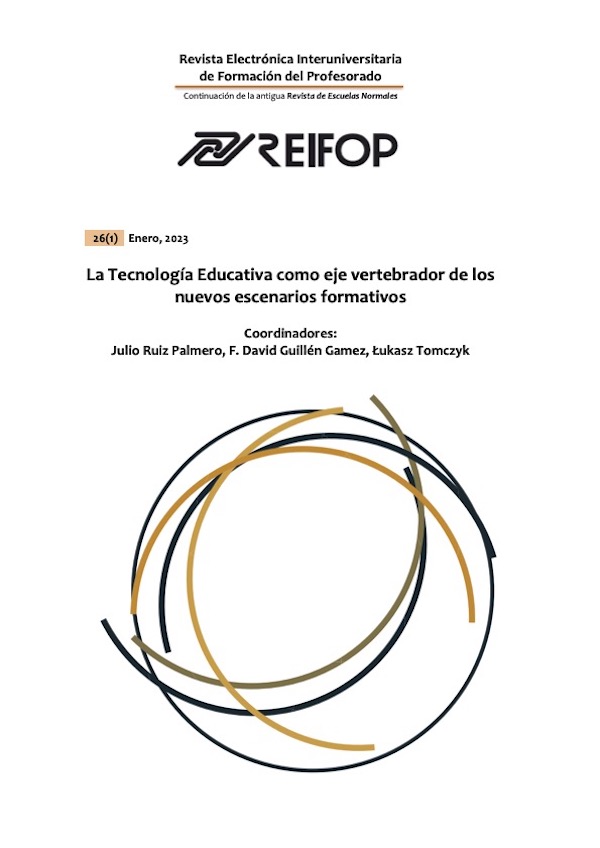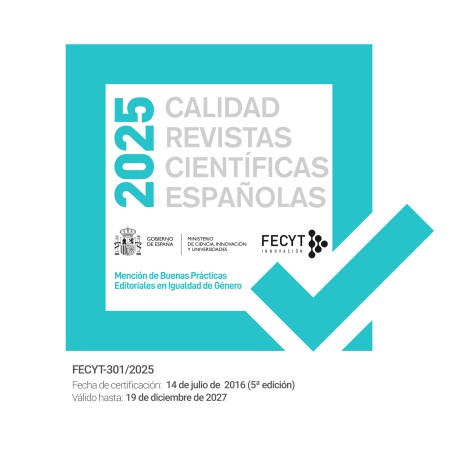Percepción del alumnado universitario respecto al aprendizaje basado en proyectos con tecnología
Resumen
Esta investigación tiene como objetivo conocer la percepción del alumnado universitario sobre una metodología didáctica derivada del Aprendizaje Basado en Proyectos y mediada por tecnología. El área de aplicación corresponde al ámbito didáctico. En concreto, al desarrollo de la competencia lingüística y la animación a la lectura desde el aula. La metodología de investigación que hemos empleado combina una aproximación descriptiva con un diseño de encuesta, y analiza la relación entre las variables observadas a través de la prueba de Pearson (r). Diseñamos una situación experimental a partir de una metodología didáctica basada en el trabajo por proyectos con tecnología, y hemos preguntado al alumnado sobre su percepción. Los resultados indican un alto nivel de satisfacción con la experiencia de enseñanza y aprendizaje. Hay una relación directa entre la afinidad de los estudiantes con la lectura y la percepción sobre el método y el recurso tecnológico. Las conclusiones destacan que, en el contexto de referencia para el estudio, los estudiantes universitarios presentan una alta satisfacción respecto a la implementación de metodologías activas basadas en proyectos y medidas por la tecnología. Hemos averiguado que la consideración de los intereses del alumnado incide directamente sobre una valoración positiva de las estrategias didácticas.
Descargas
-
Resumen2699
-
PDF1545
Citas
Barba-Martín, R. A., Velasco, M. S., & García-Martín, N. (2018). “Presencia, participación y progreso”: El aprendizaje basado en proyectos en la trayectoria de una maestra en formación. Revista Electrónica Interuniversitaria de Formación del Profesorado, 21(2), 13-25. https://doi.org/10.6018/reifop.21.2.323201
Beaudry, S. (2022). Zero to Go: The Factors that Lead to Growing Active Learning Classrooms. Journal of Learning Spaces, 11(1), Article 1. http://libjournal.uncg.edu/jls/article/view/2177
Buzzetto-More, N. (2008). Student Perceptions of Various E-Learning Components. Interdisciplinary Journal of E-Learning and Learning Objects, 4(1), 113-135.
Cain, K., & Oakhill, J. (2006). Assessment matters: Issues in the measurement of reading comprehension. British Journal of Educational Psychology, 76(4), 697-708. https://doi.org/10.1348/000709905X69807
Capodieci, A., Cornoldi, C., Doerr, E., Bertolo, L., & Carretti, B. (2020). The Use of New Technologies for Improving Reading Comprehension. Frontiers in Psychology, 11. https://www.frontiersin.org/article/10.3389/fpsyg.2020.00751
Cavanagh, A. J., Aragón, O. R., Chen, X., Couch, B. A., Durham, M. F., Bobrownicki, A., Hanauer, D. I., & Graham, M. J. (2016). Student Buy-In to Active Learning in a College Science Course. CBE—Life Sciences Education, 15(4), ar76. https://doi.org/10.1187/cbe.16-07-0212
Chance, R., & Lesesne, T. (2012). Rethinking reading promotion: Old school meets technology. Teacher Librarian, 39(5), 26-29.
Ellis, R. (1997). The empirical evaluation of language teaching materials. ELT Journal, 51(1), 36-42. https://doi.org/10.1093/elt/51.1.36
Frick, T. W., Chadha, R., Watson, C., Wang, Y., & Green, P. (2009). College student perceptions of teaching and learning quality. Educational Technology Research and Development, 57(5), 705-720. https://doi.org/10.1007/s11423-007-9079-9
García, J. B., & Riquelme, F. (2020). Educar para ser. El reto de acompañar en busca de sentido. SM.
Godzicki, L., Godzicki, N., Krofel, M., & Michaels, R. (2013). Increasing Motivation and Engagement in Elementary and Middle School Students through Technology-Supported Learning Environments. Saint Xavier University of Chicago, Illinois. https://eric.ed.gov/?id=ED541343
Gómez-Trigueros, I. (2019). Methodologies Gamified as Didactic Resources for Social Sciences. International Journal of Emerging Technologies in Learning (IJET), 14(23), 193-207.
Haerazi, H., Prayati, Z., & Vikasari, R. M. (2019). Practicing Contextual Teaching and Learning (CTL) Approach To Improve Students’ Reading Comprehension In Relation To Motivation. English Review: Journal of English Education, 8(1), 139-146. https://doi.org/10.25134/erjee.v8i1.2011
Halaas, L. S.-A. (2010). Reading comprehension: Unanswered questions and reading instruction challenges. En T. E. Scruggs & M. A. Mastropieri (Eds.), Literacy and Learning (Vol. 23, pp. 115-153). Emerald Group Publishing Limited. https://doi.org/10.1108/S0735-004X(2010)0000023007
Hidi, S. (2001). Interest, Reading, and Learning: Theoretical and Practical Considerations. Educational Psychology Review, 13(3), 191-209. https://doi.org/10.1023/A:1016667621114
Ilter, B. G. (2009). Effect Of Technology On Motivation In EFL Classrooms. Turkish Online Journal of Distance Education, 10(4), 136-158.
Jeong, K.-O. (2017). University Students’ Perception and Motivation of Using Digital Applications as Effective English Learning Tools. 2017 International Conference on Platform Technology and Service (PlatCon), 1-4. https://doi.org/10.1109/PlatCon.2017.7883735
León, O. G., & Montero, I. (2003). Métodos de investigación en psicología y educación. McGraw-‐Hill.
LoPresto, M. C., & Slater, T. F. (2016). A New Comparison Of Active Learning Strategies To Traditional Lectures For Teaching College Astronomy. Journal of Astronomy & Earth Sciences Education (JAESE), 3(1), 59-76. https://doi.org/10.19030/jaese.v3i1.9685
Lumpkin, A., Achen, R., & Dodd, R. (2015). Focusing Teaching on Students: Examining Student Perceptions of Learning Strategies. Quest, 67(4), 352-366. https://doi.org/10.1080/00336297.2015.1082143
Margallo González, A. M. (2012). La educación literaria en los proyectos de trabajo. Revista iberoamericana de educación, (59), 139-156. https://redined.educacion.gob.es/xmlui/handle/11162/182652
Mateo, J. (2012). La investigación ex post-facto. En Bisquerra, R. (Ed.), Metodología de investigación educativa (pp. 195-229). La Muralla.
Mendenhall, A., & Johnson, T. E. (2010). Fostering the development of critical thinking skills, and reading comprehension of undergraduates using a Web 2.0 tool coupled with a learning system. Interactive Learning Environments, 18(3), 263-276. https://doi.org/10.1080/10494820.2010.500537
Mezynski, K. (1983). Issues Concerning the Acquisition of Knowledge: Effects of Vocabulary Training on Reading Comprehension. Review of Educational Research, 53(2), 253-279. https://doi.org/10.3102/00346543053002253
Miller, C. J., & Metz, M. J. (2014). A comparison of professional-level faculty and student perceptions of active learning: its current use, effectiveness, and barriers. Advances in physiology education, 38(3), 246-252. https://doi.org/10.1152/advan.00014.2014
Muñoz-Carril, P.-C., Hernández-Sellés, N., Fuentes-Abeledo, E.-J., & González-Sanmamed, M. (2021). Factors influencing students’ perceived impact of learning and satisfaction in Computer Supported Collaborative Learning. Computers & Education, 174, 104310. https://doi.org/10.1016/j.compedu.2021.104310
Musons, J. (2021). Reinventar la escuela. Arpa.
Ballesta-Pagán, J., Izuierdo-Rus, T., & Romero-Sánchez, B. E. (2011). Percepción del alumnado de Pedagogía ante el uso de metodologías activas. Educatio Siglo XXI, 29(2), 353-368.
Pate, L. P. (2016). Technology implementation: Impact on students’ perception and mindset. The International Journal of Information and Learning Technology, 33(2), 91-98. https://doi.org/10.1108/IJILT-10-2015-0033
Pérez-Juste, R. (2009). Estadística aplicada a la educación. Pearson Educación.
Rutkowski, L., Rutkowski, D., & Liaw, Y.-L. (2019). The existence and impact of floor effects for low-performing PISA participants. Assessment in Education: Principles, Policy & Practice, 26(6), 643-664. https://doi.org/10.1080/0969594X.2019.1577219
Sadeghi, N., Kasim, Z. M., Tan, B. H., & Abdullah, F. S. (2012). Learning Styles, Personality Types and Reading Comprehension Performance. English Language Teaching, 5(4), 116-123.
Sánchez-Rivas, E. (2018). Cuando el proyecto sustituye a los apuntes. Harvard Deusto. Learning & Pedagogics, 14, 14-21.
Sánchez-Rivas, E., Sánchez-Rodríguez, J., & Ruiz-Palmero, J. (2019). Percepción del alumnado universitario respecto al modelo pedagógico de clase invertida. Magis, Revista Internacional de Investigación en Educación, 11(23), 151-168. https://doi.org/10.11144/Javeriana.m11-23.paur
Smeda, N., Dakich, E., & Sharda, N. (2014). The effectiveness of digital storytelling in the classrooms: A comprehensive study. Smart Learning Environments, 1(1), 6. https://doi.org/10.1186/s40561-014-0006-3
Smirnova, Z. V., Vaganova, O. I., Vinnikova, I. S., Lapshova, A. V., & Golubeva, O. V. (2020). Modern Multimedia Didactic Tools of Interactive Training. En E. G. Popkova (Ed.), Growth Poles of the Global Economy: Emergence, Changes and Future Perspectives (pp. 485-491). Springer International Publishing. https://doi.org/10.1007/978-3-030-15160-7_49
Trujillo, F. (2016). Aprendizaje basado en proyectos. Infantil, Primaria y Secundaria. Ministerio de Educación.
Tugrul, T. O. (2012). Student Perceptions of an Educational Technology Tool: Video Recordings of Project Presentations. Procedia - Social and Behavioral Sciences, 64, 133-140. https://doi.org/10.1016/j.sbspro.2012.11.016
Menjivar-Valencia, E., Sánchez-Rivas, E., Ruiz-Palmero, J., & Gámez, F. D. G. (2022). Perceptions of university students about virtual reality as a didactic resource: A pre-experimental study with a control and experimental group. IJERI: International Journal of Educational Research and Innovation, 17, 152-171. https://doi.org/10.46661/ijeri.5904
Vogler, C. (1998). El viaje del escritor. Las estructuras míticas para escritores, guionistas, dramaturgos y novelistas. Manontroppo.
Los artículos que se publican en esta revista están sujetos a los siguientes términos:
1. El Departamento de Métodos de Investigación y Diagnóstico en Educación de la Universidad de Murcia (España), junto con el Servicio de Publicaciones de la Universitdad de Murcia (Editum) son los editores de la revista REIFOP y conserva los derechos patrimoniales (copyright) de los artículos publicados, permitiendo la reutilización de las mismos bajo la licencia de uso indicada en el punto 2.
2. Las obras se publican en la edición electrónica de la revista bajo una licencia Creative Commons Reconocimiento-NoComercial-SinObraDerivada 3.0 España (texto legal). Se pueden copiar, usar, difundir, transmitir y exponer públicamente, siempre que: i) se cite la autoría y la fuente original de su publicación (revista, editores y URL de la obra); ii) no se usen para fines comerciales; iii) se mencione la existencia y especificaciones de esta licencia de uso.
3. Condiciones de auto-archivo. Se permite y se anima a los autores a difundir electrónicamente las versiones pre-print (versión antes de ser evaluada) y/o post-print (versión evaluada y aceptada para su publicación) de sus obras antes de su publicación, ya que favorece su circulación y difusión más temprana y con ello un posible aumento en su citación y alcance entre la comunidad académica. Color RoMEO: verde.
















